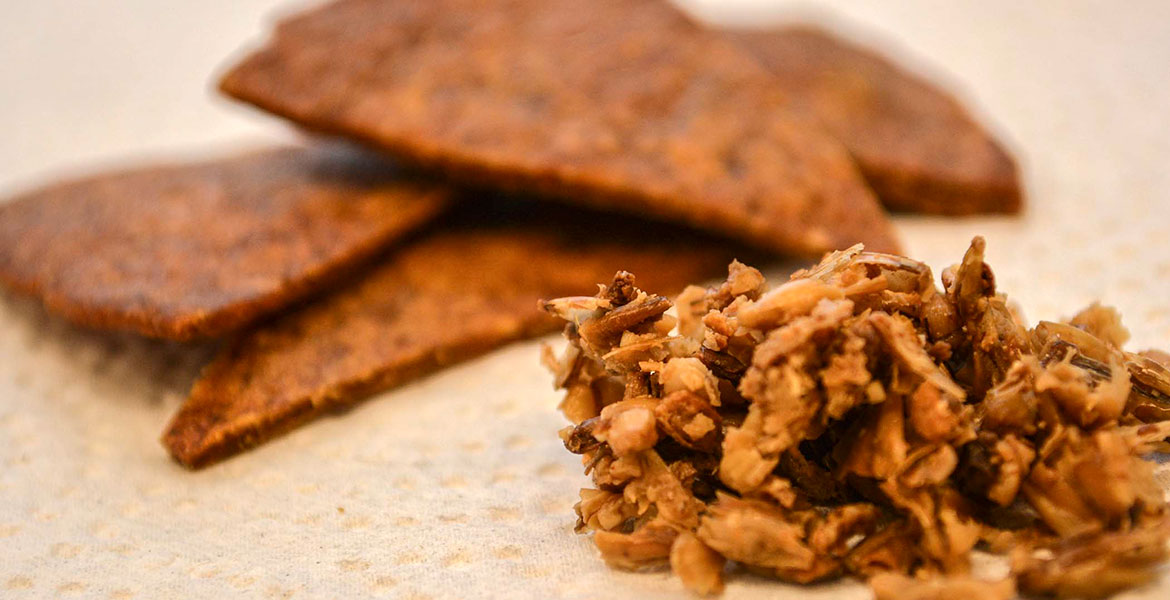
OSU researchers brewing innovation
Tuesday, August 20, 2019
Iron Monk Brewing Co. in Stillwater, Oklahoma, has been a popular nighttime attraction for Oklahoma State University students and town residents alike. With the business’ growing popularity, researchers at the OSU Robert M. Kerr Food and Agricultural Products Center recognized a potential opportunity.
“Whenever beer is brewed, they use grain and yeast,” said Danielle Bellmer, FAPC food process engineer and biosystems and agricultural engineering professor. “All that solid material left after the brewing process, all the solid waste, is brewer’s spent grain.”
BSG is the most abundant by-product created from the brewing process, and more than 38 million tons are produced each year.
Cast off as a waste product, Bellmer said BSG is practically given to livestock producers to be used as feed or sent to a landfill. Even when repurposed as a livestock feed, Bellmer said BSG is 75% moisture, so it has an extremely short shelf life.
While BSG possesses nutritional value for livestock, Bellmer said the product’s full potential is not being reached. Bellmer has begun to work on a new research project at FAPC in hopes of evaluating methods for developing a human snack product made of brewers’ spent grain.
“It has a lot higher value if it’s used in human food,” she said. “We’re just trying to make a value-added food product that contains a significant amount of BSG.”
Despite containing valuable nutritional components such as protein, fiber and antioxidants, BSG is not often seen in food production for human consumption.
Previous food products such as cakes or cookies containing BSG were found to be brittle in texture and contain strong nutty flavors and dark color profiles, all traits deemed to be undesirable by consumers.
Bellmer’s research has taken those previously unappealing qualities about BSG products and attempted to develop a recipe for a product in which the traits are desirable. From chips to crackers, Bellmer’s work at FAPC resulted in the creation of a flatbread-based chip containing 40% BSG.
Past research showed products containing more than 10% BSG were considered unpalatable, but FAPC staff’s latest flatbread-like chip has been more successful at incorporating the BSG into a desirable product.
“There isn’t a magic number, but the more [BSG] the better,” she said. “The research is evolving as we do different levels of BSG and how that changes the properties of the [product.]”
In addition to helping reduce waste, Bellmer said the idea for this research stemmed from the idea of making better use of the valuable nutritional components in BSG.
On a dry weight basis, BSG roughly contains 16% protein. The by-product also contains significant amounts of other vitamins and minerals, Bellmer said.
“I just think it’s a great opportunity to turn a waste product, which is usually a cost, into a value-added product, which is an asset,” she said. “It’s good for agricultural businesses but can also reduce what is being sent to the landfill.”
Bellmer said the future for this product is bright. She hopes Iron Monk Brewing Co. staff will be able to select their preferred product recipe and look to FAPC for sensory testing before offering the product in their own taproom.
With Iron Monk’s donation of BSG for this project, Bellmer said the tests are being conducted with the company in mind, but breweries everywhere will have access to this research.
“If we can make [a BSG product] here, breweries across the country could use it, make their own products and hopefully turn a waste product into something useful,” she said.
MEDIA CONTACT: Mandy Gross | FAPC Communications Services | mandy.gross@okstate.edu
